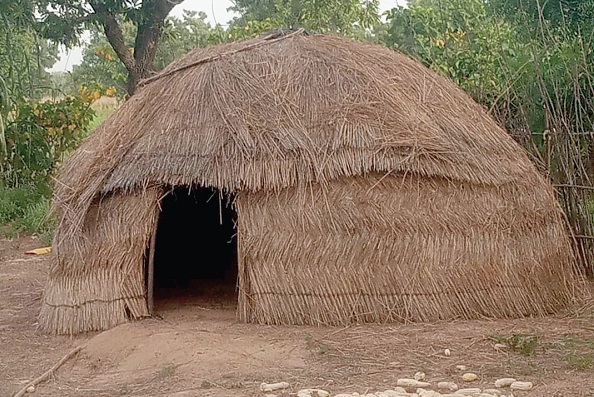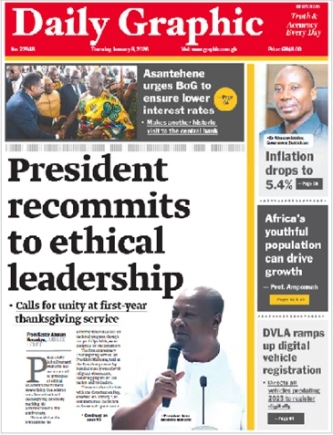
Excluded by language, distance: Fulbe nomads struggle for inclusive healthcare
A Wudu Issahaka, a 50-year-old herdsman at Kojokura, a nomadic settlement in the West Gonja Municipality in the Savannah Region, was rushed to a health facility one hot afternoon last year, feeling feverish and barely able to stand.
He had been battling illness for days and his condition worsened until his family rushed him for urgent medical care.
But when they arrived at the facility, a harsh reality awaited them. He could not access free healthcare because he had no National Health Insurance Scheme (NHIS) card.
Every service and every treatment had to be paid for in cash.
According to Issahaka, his family was asked to pay GH¢1,000 at the revenue unit of the hospital before they could commence treatment on him.
For Issahaka, this moment brought a wave of panic and helplessness as his family did not have much cash on them. The family had to rush back to the village to borrow funds from friends and relatives for his treatment.
Sharing his experience with the Daily Graphic, Mr Issahaka explained that he had tried several times to register for the NHIS but he was unsuccessful due to the language barrier and what he perceived as discrimination.
“I have been to the National Health Insurance office in the area twice but I couldn’t register because I couldn’t communicate with the officials due to language barrier.
“The first time I went there, I joined the queue to register for the card but one officer told me to let the residents register before me. I got frustrated and left,” he lamented.
In a similar situation, Amadu Mohammed, another Fulbe herdsman at Bagurugu in the Karaga District of the Northern Region, said a few months ago, he left his livestock in the care of his brother and trekked several miles under the blazing sun from his village to the district capital, hoping to acquire an NHIS card.
What he thought would be a simple process to acquire the card to enable him access to free and quality healthcare, turned into disappointment and frustration.
He recounted that none of the officials understood Fulbe, the language he spoke, so an unidentified man who offered to assist took money from him and disappeared.
Feeling frustrated and helpless, he returned home without acquiring the NHIS card.
![]()
Broader situation
The experiences of Awudu Issahaka and Amadu Mohammed highlight the frustration, exclusion and discrimination Fulbes (known as Fulanis in English) across the country go through to access basic services, including healthcare and NHIS.
In northern Ghana, mobile populations such as the Fulbes who settle in remote and hard-to-reach areas are among the most marginalised and vulnerable.
While the exact population of Fulbes in Ghana is unclear, it is estimated that there are 500,000 across the country, according to checks by the Daily Graphic.
Their mobile lifestyle, driven by livestock rearing and the search for grazing land, often places them on the fringes of essential social services such as healthcare.
A study conducted by the Ghana Statistical Service (GSS) in 2021 revealed that over 20 per cent of residents in rural northern communities cite language as a primary barrier to accessing public services, including healthcare.
Further data from the Ministry of Health indicates that as of 2024, the total active membership of the NHIS in Ghana is 17.8 million, representing 61.39 per cent of the population.
Despite the relatively increased membership enrolment, marginalised groups like the Fulbes still face significant challenges in acquiring the card.
Equal treatment
![]()
Yayaha Mohammed, President of the Fulani Youth Association of Ghana
The President of the Fulani Youth Association of Ghana (FUYAG), Yahaya Mohammed, corroborated the residents' claims and pointed out that language barriers and remoteness should not justify the exclusion of nomads from accessing basic services such as the NHIS card.
“The right to healthcare is a fundamental human right. The majority of Fulbes are citizens of the country because they were born here, and even their grandparents were born in the country, so they are citizens and must be treated fairly," he stated.
He, therefore, urged the National Health Insurance Authority (NHIA) to provide language interpretation services and to conduct dedicated outreach programmes within Fulbe settlements to bridge the gap.
Challenges
Responding to the claims, the Karaga District NHIA Manager, Ziblim Abdulai, explained that network connectivity and poor road network posed a significant challenge in reaching remote nomadic communities.
"Although the officers sometimes find it difficult to communicate with some of the Fulbes due to the language barrier, the registration process is usually smooth at the office, except when there are network issues.
“The real challenge is going directly to their communities, where the network is often unreliable," he said.
Due to these technical challenges, he said the authority was at present operating in only seven communities within the Karaga District, covering a fraction of the district's settlements.
Mr Abdulai indicated that the NHIA was currently exploring solutions, including the use of Ghana Cards, for streamlined registration, adding that once fully adopted, it would facilitate easier access and reduce reliance on physical registration sites.
Social protection
Instituted in 2003, the NHIS is a key Social Protection (SP) intervention that is reducing financial barriers to healthcare and offering subsidised or free medical services to all registered Ghanaians.
Designed as a key component of Ghana’s social protection framework, NHIS aims to make healthcare accessible for every citizen, regardless of their financial, geographical, or social standing.
While the NHIS has been celebrated for extending essential health services to millions, it faces several challenges, particularly in reaching underserved and marginalised communities.
For communities such as the Fulbe settlements, the NHIS’s absence reinforces a sense of exclusion. However, addressing these gaps requires not only physical resources but also policy support to prioritise outreach efforts and overcome these logistical hurdles.
![]() Alima Sagito Saeed, a Social Protection Advocate
Alima Sagito Saeed, a Social Protection Advocate
For Social Protection Advocate Alima Saeed Sagito, the discrimination against the nomads had denied some of them access to many social protection services.
“Many Fulbe are now part of Ghanaian society and NHIS needs to extend access to these hard-to-reach communities.
“Social protection including health insurance is a right that should reach all residents, regardless of geographical or cultural factors,” she asserted.
She advised the Fulbes to speak up and strongly advocate for their rights, saying “Fulbes must come together as a community to make themselves visible and insist on equal access to basic services.”
Additionally, she called for increased funding and support from state and donor agencies to enable NHIS to expand its reach and serve everyone irrespective of their race or location.
![]() A Fulbe herdsman herding cattle in the bush
A Fulbe herdsman herding cattle in the bush
Way forward
Given the high poverty and health disparities in the north, ensuring access to NHIS for nomadic communities is critical for achieving national healthcare coverage goals and the Sustainable Development Goal (SDG 3), which aims to avert needless suffering from preventable diseases and premature death, by focusing on key targets that boost the health of a country's overall population by 2030.
Therefore, there is a need for the NHIA to recruit interpreters or train existing staff in commonly spoken languages within specific regions, especially in rural and underserved settlements such as the Fulbe to help eliminate communication barriers that deter NHIS enrolment.
Also, mobile units equipped with the necessary network and registration technology must be deployed to remote and underserved communities on a regular schedule to attend to the people.
Writer’s email: mohammed.fugu@graphic.com.gh

 Click the link to read your copy.
Click the link to read your copy.